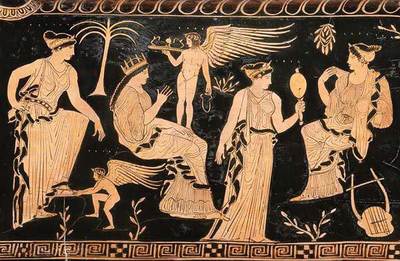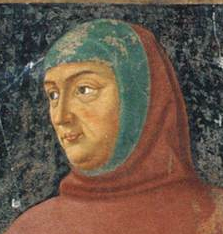Homer, Cicero and the authors of the Bible created some of the foundational texts of Western culture, and many of us have studied one or more of their works in translation. But how many of us have read them in their original languages (ancient Greek, Latin and Biblical Hebrew)?
 Maybe more to the point: Why would we undertake such a task? Why read the original when we can read these venerable works in modern English?
Maybe more to the point: Why would we undertake such a task? Why read the original when we can read these venerable works in modern English?
Faculty members in the UO Department of Classics and the Judaic Studies Program are well acquainted with this line of questioning. Students and parents want to know why time and effort should be expended in the study of “dead” languages that make it possible to read ancient works in the original.
Our faculty members are not alone in fielding these questions. The value of studying ancient languages is being challenged far and wide, with some universities choosing to discontinue such language studies (SUNY Albany, for instance—see Dean’s Page in this issue). But not the UO. In fact, the College of Arts and Sciences recently hired faculty members to support the teaching of classical Arabic, adding to the existing curriculum of Latin, ancient Greek and Biblical Hebrew studies.
We asked three scholars of ancient languages to offer their perspective on the debate.
Read three (very different) English translations of Horace's Ode 1.38
Interview by Patricia Hickson
Q: What can we learn from studying ancient societies?
Malcolm Wilson, department head, classics: Students pursuing education in the classics are often seeking answers to the big questions: How do I fit into human society? How did we get here in the twenty-first century? Why do we live in the kind of commercial society that we do? What is the genesis of that? It is important to recognize that the kinds of social concerns we have now have a history, and it’s a deep history. Throughout the last 2,500 years, we’ve reshaped our society from its origins, but many of our principles are organically connected with the society of the Greeks. The choices we make today are the results of choices made hundreds of years ago, and those, in turn, are the result of reflection upon what occurred in human society before then. Without going back to that history you can’t understand why we are here now. History is a record of the possibility of human behavior, and that is a very important concept to understand for the social thinker, politician, economist and general human being.
Mary Jaeger, professor, classics: There is so much cultural continuity with the ancient Greeks and Romans, in fields ranging from rhetoric and speech making to lyric poetry (which took from Greek authors the idea of the personal voice, of expressing and writing down personal experiences and emotions). The Greeks developed the genre of written history, which conceived of causation in human terms instead of divine intervention. The idea of standing back and having rational and analytical discussions about the best way to live—this is a Greek idea. And many of these ideas came into the European tradition by way of the Romans.
 Deborah Green, program director, Judaic studies: The study of ancient societies helps us to understand our own. We can compare them and draw out the similarities and differences. By doing so, we have a blueprint for understanding what went wrong so we can avoid the mistakes of our past. Likewise, as in the case of ancient Israel, it allows us to see how far certain ideas have evolved. Even within the Hebrew Bible itself we can see the progression of an entire culture—a culture that by the end of the overarching narrative so values the poor and vulnerable of society that it views taking care of the downtrodden as the responsibility of all who live in the world. What could be a more important message than that for our own time?
Deborah Green, program director, Judaic studies: The study of ancient societies helps us to understand our own. We can compare them and draw out the similarities and differences. By doing so, we have a blueprint for understanding what went wrong so we can avoid the mistakes of our past. Likewise, as in the case of ancient Israel, it allows us to see how far certain ideas have evolved. Even within the Hebrew Bible itself we can see the progression of an entire culture—a culture that by the end of the overarching narrative so values the poor and vulnerable of society that it views taking care of the downtrodden as the responsibility of all who live in the world. What could be a more important message than that for our own time?
Q: What are some of the limitations of reading a translation?
Wilson: You cannot fully model ancient languages with the modern. Each language comes with its own way of dividing the world conceptually, and later cultures can only attempt to model the original language. Translation is not a code where there is a one-to-one correspondence of words. Every translation, every edition is the result of innumerable choices. Do we have a perfect understanding? Can we make a perfect facsimile of the original in our modern language? No. Also, sometimes people simply misinterpret text. And if the original is gone, you are stuck with the misunderstanding; there is no way to correct it.
Jaeger: When you have effectively translated, you have conveyed an idea, but it’s never a perfect translation. There are concepts that don’t come across. The ideas are different in the original version of whatever language. You are going to get closer to the author’s thoughts in the original. Part of this owes to the structure of the language itself. Latin has some 40,000 words. English has about a million words. Therefore Latin has to do something different with word order—where the word is in the sentence—and all sorts of things that relate to context. In English you can just pull in a different word. English has a very rigid word order. Man bites dog. But in Latin, it is often the emphasis that is important; it is going to be the word endings that tell you who bit whom, or the context of the phrase. Finally, the poetry is incredible. There is a richness to the literature in its original language that cannot be translated.
Green: Our understanding of society, of basic themes in English literature, the foundational stories of our culture, all come from the Bible. Yet, we don’t realize how heavily interpreted these stories are. Biblical Hebrew is very, very difficult and also very sparse. It has very few words. This means every time a work is translated, it is actually interpreted. Translation is an interpretive exercise. Until you learn to read in the original, you can’t see the choices translators have made. When you start to read and translate Biblical Hebrew, you realize how very little we know about the original author’s intention. You really begin to understand the extent to which our knowledge of the Bible has been dramatically shaped by interpretation.
Q: What kinds of skills might be acquired in the study of ancient languages?
Jaeger: Studying Greek or Latin is so valuable because it is so analytical. It’s a great exercise for the mind, in addition to being tremendous fun and very rigorous. It exercises your memory, enhances your ability to be precise and your ability to hold information in your head before coming to a conclusion. It also helps with a general understanding of language: participles, clauses, syntax—we teach those ideas deliberately. When you study Latin you get profound insight into good English. From the perspective of a person interested in learning other foreign languages, once you’ve learned Latin, the grammar of the Romance languages makes a lot of sense.
Green: We are inundated with information today—so much information comes to us via the computer, from television, from everything we experience. In business you have to sort through that information and figure out what is gold and what is dross. How do you figure out the problem, the narrative, the solution? You have to first engage your rational mind to acquire the information and then evaluate it to discern “what do I need to know?” To effectively translate requires you to make a choice with every word. You ask questions and you listen for the answers until they tell you a story. Those activities—analyzing information, discerning what is important from what isn’t important, engaging the rational mind in order to make and sustain an argument—that’s what happens when you do translation. You are making choices and producing a result and then you have to stand behind it. You have to come up with a solid argument for how and why you made those choices. These are the skills of creative enterprise.

Why Study Ancient Languages?
Online Extras
Majors on the March
 The College of Arts and Sciences stepped out for the “Celebrating Champions” parade.
The College of Arts and Sciences stepped out for the “Celebrating Champions” parade.
Beyond Zebra Fish Fame
 Get a glimpse into George Streisinger's fascinating personal story in an excerpt from a book by his widow, Lotte.
Get a glimpse into George Streisinger's fascinating personal story in an excerpt from a book by his widow, Lotte.
There's A Class For That
 A new course will provide UO students with mobile smart phones and a mission: to build smart-phone apps.
A new course will provide UO students with mobile smart phones and a mission: to build smart-phone apps.
Jackson Pollock Curse
 Richard Taylor can finally tell the tale: how his research with fractals drew him into a world of international art intrigue.
Richard Taylor can finally tell the tale: how his research with fractals drew him into a world of international art intrigue.
Martin Luther King Jr. Awards
 Two CAS faculty members have been honored with the 2011 UO MLK Award.
Two CAS faculty members have been honored with the 2011 UO MLK Award.
Petrarch Madrigal
 Petrarch is not only going digital at the UO, but musical as well.
Petrarch is not only going digital at the UO, but musical as well.
